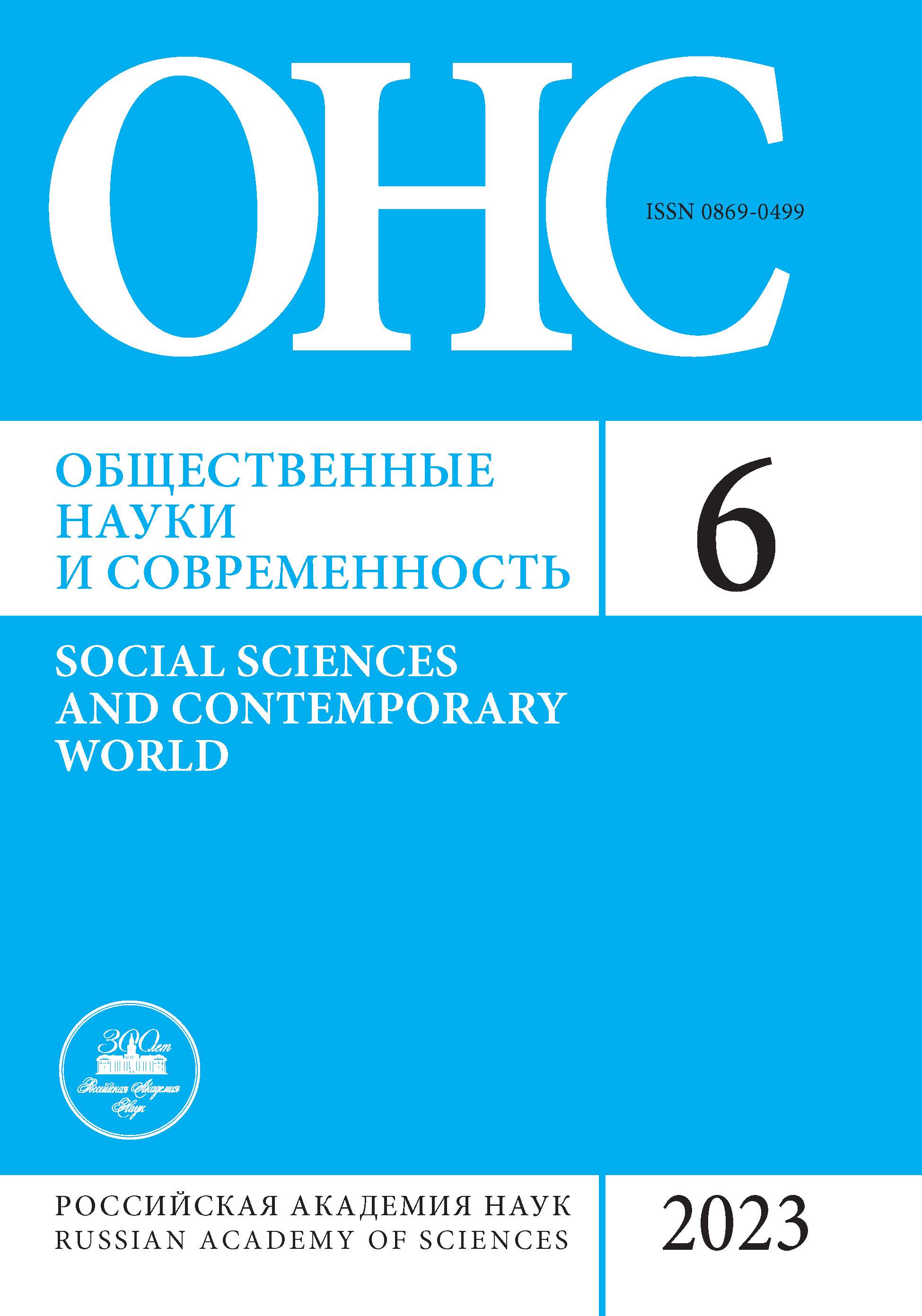The least developed countries: ICT landscape and possible directions of support
- Авторлар: Egerev S.V.1
-
Мекемелер:
- Institute of Scientific Information for Social Sciences of the Russian Academy of Sciences
- Шығарылым: № 6 (2023)
- Беттер: 60-74
- Бөлім: Articles
- URL: https://kazanmedjournal.ru/0869-0499/article/view/675143
- DOI: https://doi.org/10.31857/S0869049923060059
- EDN: https://elibrary.ru/MRFWZK
- ID: 675143
Дәйексөз келтіру
Аннотация
The ICT landscape in Least Developed Countries (LDCs) is characterized by a diverse array of infrastructure, services and public perceptions of new technologies. The dynamics of informatization within these countries are examined, focusing on the connectivity parameter to rank the 48 countries in this group. Additionally, critical components of infrastructure are highlighted, and socio-technical problems associated with ICT development are addressed, including the prevention of non-use, cargo cult mentality, and the challenge of developing local digital platforms. The analysis reveals the following key findings. 1. The notion that the future of ICTs in LDCs should rely solely on mobile communications is deemed premature due to the impact of the pandemic. 2. It is imperative to adapt services for the segment of the population in LDCs that will continue to utilize the Internet through “fixed computers with fixed access + 2G telephones” in the forthcoming years. 3. The UN agencies’ objectives of achieving widespread adoption of digital government, distance education, and e-commerce services are not always immediately attainable for LDCs. Consequently, it is concluded that the directions of international support for this process should be recalibrated in the post-Covid era.
Авторлар туралы
Sergey Egerev
Institute of Scientific Information for Social Sciences of the Russian Academy of Sciences
Email: segerev@gmail.com
Moscow, Russia
Әдебиет тізімі
- Дежина И.Г., Егерев С.В. (2022) Дежина И.Г., Егерев С.В. Технологические скачки: теория и международные ИКТ-практики // Контуры глобальных трансформаций: политика, экономика, право. Т. 15. № 3. С. 6-23.
- Alzouma G. (2005) Myths of Digital Technology in Africa: Leapfrogging Development? // Global Media and Communication. Vol. 1. No. 3. Pp. 339-356.
- Aker J.C. (2010) Information from Markets Near and Far: Mobile Phones and Agricultural Markets in Niger // American Economic Journal. Vol. 2. No. 3. Pp. 46-49.
- Aker J.C., Boumnijel R., McClelland A. (2016) Payment Mechanisms and Antipoverty Programs: Evidence from a Mobile Money Cash Transfer Experiment in Niger // Economic Development and Cultural Change. Vol. 65. No. 1. Pp. 1-37.
- Avgerou C. (2017) Theoretical Framing of ICT4D Research // In: Information and Communication Technologies for Development. IFIP Advances in Information and Communication Technology. Vol. 504. Cham: Springer. doi: 10.1007/978-3-319-59111-7_2
- Cardona M., Kretschmer T., Strobel T. (2013) ICT and Productivity: Conclusions from the Empirical Literature // Information Economics and Policy. Vol. 25. No. 3. Pp 109-125. doi: 10.1016/j.infoecopol.2012.12.002
- Czernich N., Falck O., Kretschmer T. (2011) Broadband Infrastructure and Economic Growth // The Economic Journal. Vol. 121. No. 552. Pp. 505-532. doi: 10.1111/j.1468-0297.2011.02420.x
- Davison R., Vogel D., Harris R. (2000) Technology Leapfrogging in Developing Countries - an Inevitable Luxury? // The Electronic Journal of Information Systems in Developing Countries. Vol. 1. No 1. Pp. 1-10. https://doi.org/10.1002/j.1681-4835.2000.tb00005.x
- Dewan S., Kraemer K. (2000) Information Technology and Productivity: Preliminary Evidence from Country-Level Data // Management Science, Vol. 46, No. 4, Pp. 548-562. doi: 10.1287/mnsc.46.4.548.12057
- Duggal V., Saltzman C., Klein L. (2007) Infrastructure and Productivity: an Extension into Private Infrastructure and IT Productivity // Journal of Econometrics. Vol. 140. No. 2. Pp. 485-502. doi: 10.1016/j.jeconom.2006.07.010
- Fife E., Pereira F. (2016) The Promise and Reality: Assessing the Gap Between Theory and Practice in ICT4D // Telecommunications Policy. Vol. 7. No. 40. Pp. 595-601. doi: 10.1016/j.telpol.2016.05.004
- Greenstein S., McDevitt R. (2009) The Broadband Bonus: Accounting for Broadband Internet's Impact on U.S. GDP. Working Paper No. w14758. National Bureau of Economic Research. doi: 10.3386/w14758
- Hanafizadeh P., Khosravi B., Badie K. (2019) Global Discourse on ICT and the Shaping of ICT Policy in Developing Countries // Telecommunications Policy. Vol. 43. No. 4. Pp. 324-338. doi: 10.1016/j.telpol.2018.09.004
- Harris M. (1974) Cows, Pigs, Wars and Witches: The Riddles of Culture. New York: Random House. 456 p.
- Heeks R., Eskelund K., Gomez-Morantes J.E. (2020) Digital Labour Platforms in the Global South: Filling or Creating Institutional Voids? Digital Development Working Paper SSRN. No. 86. doi: 10.2139/ssrn.3645389
- Hughes N. (2007) M-PESA: Mobile Money for the "Unbanked" Turning Cellphones into 24-Hour Tellers in Kenya // Innovations: Technology, Governance, Globalization. Vol. 2. No. 1-2. Pp. 63-81. doi: 10.1162/itgg.2007.2.1-2.63
- Kaur T., Ganganagar S., Arora A. (2023) ICT Development History and Its Application // China Petroleum Processing and Petrochemical Technology. Catalyst Research. Vol. 23. No. 2. Pp. 212-218.
- Lehr W., Gillett S., Osorio C. (2006) Measuring Broadband's Economic Impact. Working Paper MIT. 36 p. (https://dspace.mit.edu/handle/1721.1/102779)
- Masiero S., Nielsen P. (2021) Resilient ICT4D: Building and Sustaining our Community in Pandemic Times // arXiv preprint. arXiv:2108.09712. doi: 10.48550/arXiv.2108.09712
- Masiero S. (2022) Should We Still be Doing ICT4D Research? // The Electronic Journal of Information Systems in Developing Countries. Vol. 88. No. 5. e12215. doi: 10.1002/isd2.12215
- Milan S., Treré E., Masiero S. (2021) COVID-19 from the Margins: Pandemic Invisibilities, Policies and Resistance in the Datafied Society. Amsterdam: Institute of Network Cultures 2021 (Theory on Demand 40). (https://doi.org/10.25969/mediarep/19260)
- Rahman A., Arabi S., Rab R. (2021) Feasibility and Challenges of 5G Network Deployment in Least Developed Countries (LDC) // Wireless Sensor Network. Vol. 13. No. 1-16. doi: 10.4236/wsn.2021.131001
- Sassi S., Goaied M. (2013) Financial Development, ICT Diffusion and Economic Growth: Lessons from MENA Region // Telecommunications Policy. Vol. 37. Pp 252-261. doi: 10.1016/j.telpol.2012.12.004
- Waema T. (2015) ICT4D and Global Connectivity // In: The International Encyclopedia of Digital Communication and Society. New York: John Wiley & Sons, Inc. Pp 1-4. doi: 10.1002/9781118290743/wbiedcs111
- Walsham G., Sahay S. (2006) Research on Information Systems in Developing Countries: Current Landscape and Future Prospects // Information Technology for Development. Vol. 12. No. 1. Pp 7-24. doi: 10.1002/itdj.20020
Қосымша файлдар









